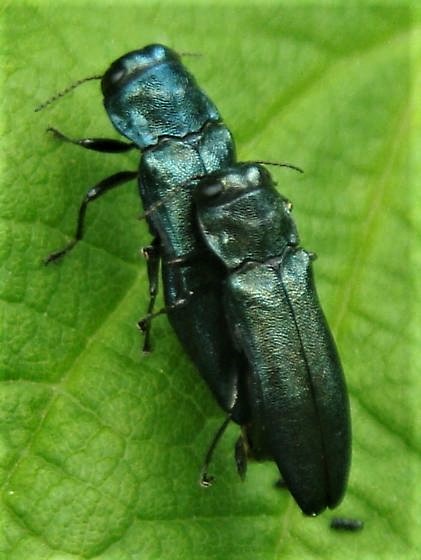Natter’s Notes
Jean R. Natter, OSU Master Gardener
The Japanese Beetle (Popillia japonica) Eradication Project

The Japanese Beetle (Popillia japonica) Eradication Project of the Oregon Department of Agriculture (ODA) issued its most recent update in late 2019.
Overall, 95% of you [within the quarantine boundary] consented to treatment this year. With your help we treated 8,500 residences, 6 schools, 8 parks, 3 shopping centers, and 1 golf course. This came out to roughly 3,000 acres.
This year we trapped 7,749 Japanese beetles in the Cedar mill area. The overall number of beetles trapped in 2019 was a 56% reduction from the previous year. There was a 65% reduction in the number of beetles trapped within the 2018 treatment boundary as a result of the 2018 granular treatment and 2019 foliar treatment. We saw a 75% decrease within the boundaries of the supplementary foliar treatment.
In order to eradicate this pest, we will continue our treatment next season. We are thrilled with our success, and will be more aggressive with our approach next year while we have the upper hand. We are currently planning a larger treatment boundary for the 2020 eradication and will update everyone soon with the new map. We thank you all for your continued support with helping Oregon eradicate Japanese beetle. It wouldn’t be possible without all of you!
We would also like to introduce the 2020 Japanese beetle team: Ashley Toland (Eradication Entomologist), Jessica Rendon (Japanese Beetle Eradication Specialist), and Austin Johnson (Japanese Beetle Outreach Coordinator).
For more information on the Japanese beetle eradication project please visit our website: https://www.japanesebeetlepdx.info/.
New exotic Agrilus species beetle on twinberry in Portland
During 2019, a new exotic beetle was reported by the Oregon Forest Pest Detector (OFPD) program.
In May, an OFPD program graduate submitted a report to the Oregon Invasive Species Hotline after finding D-shaped exit holes and a green insect on a twinberry in her yard in southeast Portland. She recognized the signs as characteristic of insects in the genus Agrilus, which includes the bronze birch borer (A. anxius) and the deadly forest pest, emerald ash borer (A. planipennis).

The green insect she found was later identified as Agrilus cyanescens, an exotic beetle that has been established in the eastern U.S. since the 1920s, but this is the first detection in the Pacific Northwest. (https://oregoninvasiveshotline.org/reports/detail/2670)
Then, in early August 2019, another OFPD graduate submitted a report to the Oregon Invasive Species Hotline after she noticed similar damage to a twinberry in her yard in northeast Portland. This was also later confirmed to also be Agrilus cyanescens. (https://oregoninvasiveshotline.org/reports/detail/2778)
Known host plants in U.S. and Europe include those in the genus Lonicera (honeysuckles) including the native plant, twinberry (Lonicera involucrata Richardson). The Oregon Department of Agriculture does not believe Agrilus cyanescens will be an economic, ecological, or horticultural pest.
But, if you do notice any signs or symptoms of Agrilus cyanescens (branch dieback; 2 mm. D-shaped exit holes; serpentine-shaped galleries beneath the bark; and metallic green beetles feeding on leaves in April-May), we encourage you to submit a report. (https://oregoninvasiveshotline.org/)
The OFPD program trains volunteers to monitor for and report potential infestations of invasive forest pests. Thank you to these two Oregon Forest Pest Detector graduates for being on the lookout and submitting reports to the Oregon Invasive Species Hotline! Details about the OFPD training program of citizen scientists are at https://extension.oregonstate.edu/ofpd.
